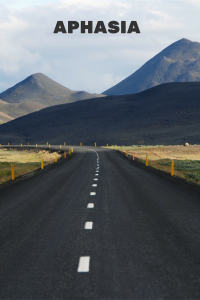Aphasia Awareness
 A stroke can occur totally out of the blue. Over 100 000 people have a stroke every year and 1 in 4 strokes happen to people under the age of 65. I have specialised in working with stroke survivors for over 15 years and would like to say thank you to them for teaching me so much including the information I am including in this blog.
A stroke can occur totally out of the blue. Over 100 000 people have a stroke every year and 1 in 4 strokes happen to people under the age of 65. I have specialised in working with stroke survivors for over 15 years and would like to say thank you to them for teaching me so much including the information I am including in this blog.
Perhaps you are not aware of the term aphasia? Approximately 1 in 3 people who have a stroke will experience aphasia and there are about 350 000 people living with aphasia in the UK. Aphasia is a difficulty with processing language. It can affect understanding, reading, speaking, writing, as well as using numbers. June is Aphasia Awareness month.
How can you help someone with aphasia? There are many things you can do to support someone with aphasia. I have covered some of these in my previous blog posts - Communication Skills, Listening or Understanding Difficulties and Difficulties with Expression or Speech. In my experience, confidence and communication are very closely linked. If someone can be supported to communicate more effectively it can have a huge associated benefit to that person’s confidence too.
 Activities that we complete every day can be significantly affected by aphasia. This might include tasks such as listening to the radio, watching television, reading cards/letters/newspapers/books, making or receiving telephone calls, writing a shopping list, following a recipe, telling the time, using money, paying bills.
Activities that we complete every day can be significantly affected by aphasia. This might include tasks such as listening to the radio, watching television, reading cards/letters/newspapers/books, making or receiving telephone calls, writing a shopping list, following a recipe, telling the time, using money, paying bills.
Social isolation can be a real issue for people with communication difficulties. Aphasia can impact upon mood due to the associated effort and frustration when attempting to communicate. Aphasia can affect relationships with friends and family. It can also affect roles and participation in household tasks, recreation and work. Psychological and emotional support is crucial during all stages of recovery. This can be sought from a variety of sources including your family and friends, other stroke survivors, stroke organisations and charities, and healthcare professionals. We are all individuals and so the source, type and amount of support we require in all areas of stroke recovery will be different.
Intervention can most definitely help. Speech and Language Therapy can have huge benefits for stroke survivors with aphasia. This support can take many forms. It might include exercises to help with specific language tasks, strategies to aid conversations between stroke survivors and families as well as education and information about aphasia and stroke. Support from other stroke survivors with aphasia can also be very beneficial.
 Aim high! In terms of all aspects of rehabilitation and recovery – I say be ambitious! I advise stroke survivors to set goals that they really wish to achieve, ones that are important and relevant to them as an individual. Include those that might be achieved in a few days or weeks as well as those that may take many months or more. Make sure stroke survivors are surrounded by people who can provide hope and positive support along the journey. Take each day as it comes. There will be tough days where it can feel as though there is a mountain to climb but also good days where improvements are made and can be reflected upon. It can help if a stroke survivor, family member or friend can keep a record of recovery. This can assist when looking back and acknowledging the progress being made. Also, please encourage focus on everything that is going well or being enjoyed otherwise it can feel as though the emphasis is only upon tasks which are challenging and require support. To all stroke survivors - you know yourself and your body, trust that instinct and believe in yourself.
Aim high! In terms of all aspects of rehabilitation and recovery – I say be ambitious! I advise stroke survivors to set goals that they really wish to achieve, ones that are important and relevant to them as an individual. Include those that might be achieved in a few days or weeks as well as those that may take many months or more. Make sure stroke survivors are surrounded by people who can provide hope and positive support along the journey. Take each day as it comes. There will be tough days where it can feel as though there is a mountain to climb but also good days where improvements are made and can be reflected upon. It can help if a stroke survivor, family member or friend can keep a record of recovery. This can assist when looking back and acknowledging the progress being made. Also, please encourage focus on everything that is going well or being enjoyed otherwise it can feel as though the emphasis is only upon tasks which are challenging and require support. To all stroke survivors - you know yourself and your body, trust that instinct and believe in yourself.
Thank you for taking the time to read my blog today. More of my blog articles are available here. Please do get in touch if there is anything you would like to share or ask.
Best wishes
Ruth

